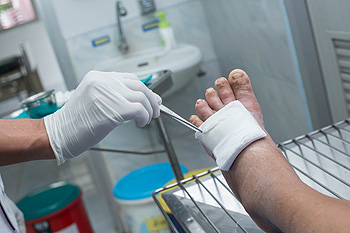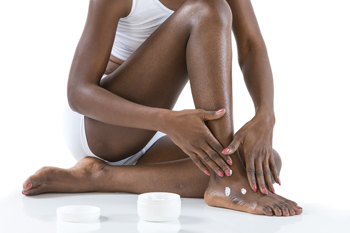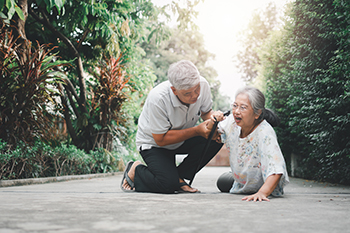Connect With Us
Blog
Items filtered by date: April 2022
Protecting Your Feet Against Ulcers

For many diabetics, regular foot care can become a new part of their life, specifically to battle neuropathy or peripheral artery disease. The poor circulation and nerve damage related to the disease can make it more difficult to detect injuries or sores on the feet and toes. As a result, open sores can become ulcerated because the healing process is slowed, and infections can set in more easily. Serious infections, if left untreated, can develop into gangrene and in extreme cases, lead to amputation. The first line of defense against foot ulcers is proper shoes, which can help to protect your feet from harm. Experts advise diabetics to avoid wearing high heels, sandals, stiff shoes, and flip-flops. They suggest wearing socks to prevent blisters and choosing shoes with ample toe room, a smooth inner lining, and a thick heel. It is also suggested that you examine your feet daily for sores, unusual coloration, or other abnormalities. If you are diabetic and have noticed problems with your feet, it is a good idea to make regular visits to a podiatrist for examination and treatment.
Diabetic foot care is important in preventing foot ailments such as ulcers. If you are suffering from diabetes or have any other concerns about your feet, contact Tanisha Richmond, DPM from Richmond Foot & Ankle, LLC. Our doctor can provide the care you need to keep you pain-free and on your feet.
Diabetic Foot Care
Diabetes affects millions of people every year. The condition can damage blood vessels in many parts of the body, especially the feet. Because of this, taking care of your feet is essential if you have diabetes, and having a podiatrist help monitor your foot health is highly recommended.
The Importance of Caring for Your Feet
- Routinely inspect your feet for bruises or sores.
- Wear socks that fit your feet comfortably.
- Wear comfortable shoes that provide adequate support.
Patients with diabetes should have their doctor monitor their blood levels, as blood sugar levels play such a huge role in diabetic care. Monitoring these levels on a regular basis is highly advised.
It is always best to inform your healthcare professional of any concerns you may have regarding your feet, especially for diabetic patients. Early treatment and routine foot examinations are keys to maintaining proper health, especially because severe complications can arise if proper treatment is not applied.
If you have any questions please feel free to contact our office located in Dayton, OH . We offer the newest diagnostic and treatment technologies for all your foot and ankle needs.
Risks of an Achilles Rupture
When you experience a complete tear of the Achilles tendon in the ankle, it is called an Achilles rupture. The list of those most likely to have this condition can include: men over 40, athletes who play sports such as football, tennis, or rugby, women who wear high heels, athletes who consistently ignore Achilles pain, and athletes who have had a recent ankle injury, overpronate, or have a thinner Achilles tendon. Still other risk factors include being overweight, taking certain medications, or using corticosteroids. What does a ruptured Achilles tendon feel like? It reportedly feels like someone has kicked or hit you in the back of the heel. Ignoring the warning signs, such as a pain that builds gradually or the pain from another ankle injury, increases the risk of such a tear. To avoid this occurrence, it is a good idea to see a podiatrist, who can perform a full biomechanical analysis to determine whether you may need orthotics or specific stretching and strengthening exercises. It is possible to recover from this painful event, but prevention is better.
Achilles tendon injuries need immediate attention to avoid future complications. If you have any concerns, contact Tanisha Richmond, DPM of Richmond Foot & Ankle, LLC. Our doctor can provide the care you need to keep you pain-free and on your feet.
What Is the Achilles Tendon?
The Achilles tendon is a tendon that connects the lower leg muscles and calf to the heel of the foot. It is the strongest tendon in the human body and is essential for making movement possible. Because this tendon is such an integral part of the body, any injuries to it can create immense difficulties and should immediately be presented to a doctor.
What Are the Symptoms of an Achilles Tendon Injury?
There are various types of injuries that can affect the Achilles tendon. The two most common injuries are Achilles tendinitis and ruptures of the tendon.
Achilles Tendinitis Symptoms
- Inflammation
- Dull to severe pain
- Increased blood flow to the tendon
- Thickening of the tendon
Rupture Symptoms
- Extreme pain and swelling in the foot
- Total immobility
Treatment and Prevention
Achilles tendon injuries are diagnosed by a thorough physical evaluation, which can include an MRI. Treatment involves rest, physical therapy, and in some cases, surgery. However, various preventative measures can be taken to avoid these injuries, such as:
- Thorough stretching of the tendon before and after exercise
- Strengthening exercises like calf raises, squats, leg curls, leg extensions, leg raises, lunges, and leg presses
If you have any questions please feel free to contact our office located in Dayton, OH . We offer the newest diagnostic tools and technology to treat your foot and ankle needs.
Heel Pain Can Be Treated!
How People With Diabetes Can Help Prevent Falls
Staying healthy and fit as you age will help you avoid falling. This is particularly important for people with diabetes, whose balance can be compromised from complications such as peripheral neuropathy (nerve damage), hypoglycemia, diabetic retinopathy (vision problems), as well as joint pain, and osteoporosis (bone damage). If you are experiencing balance issues or pain that is affecting your mobility, consult with a podiatrist who may be able to prescribe diabetic shoes and/or custom orthotics that will offer better support and alignment, to help you walk better. You can also discuss the possibility of improving your balance by strengthening your muscles and maintaining bone density with various gentle forms of exercise and physical therapy. Your podiatrist can also offer various forms of treatment to help relieve symptoms of peripheral neuropathy.
Preventing falls among the elderly is very important. If you are older and have fallen or fear that you are prone to falling, consult with Tanisha Richmond, DPM from Richmond Foot & Ankle, LLC. Our doctor will assess your condition and provide you with quality advice and care.
Every 11 seconds, an elderly American is being treated in an emergency room for a fall related injury. Falls are the leading cause of head and hip injuries for those 65 and older. Due to decreases in strength, balance, senses, and lack of awareness, elderly persons are very susceptible to falling. Thankfully, there are a number of things older persons can do to prevent falls.
How to Prevent Falls
Some effective methods that older persons can do to prevent falls include:
- Enrolling in strength and balance exercise program to increase balance and strength
- Periodically having your sight and hearing checked
- Discuss any medications you have with a doctor to see if it increases the risk of falling
- Clearing the house of falling hazards and installing devices like grab bars and railings
- Utilizing a walker or cane
- Wearing shoes that provide good support and cushioning
- Talking to family members about falling and increasing awareness
Falling can be a traumatic and embarrassing experience for elderly persons; this can make them less willing to leave the house, and less willing to talk to someone about their fears of falling. Doing such things, however, will increase the likelihood of tripping or losing one’s balance. Knowing the causes of falling and how to prevent them is the best way to mitigate the risk of serious injury.
If you have any questions, please feel free to contact our office located in Dayton, OH . We offer the newest diagnostic and treatment technologies for all your foot care needs.
Women’s Foot Care
 April is Foot Health Month! To honor the importance of good foot health and prepare for the warmer months and more attractive sandal-wearing, we can give our feet the proper time and attention they deserve for all they do for us. Because of all we subject our feet to, they are the part of the body that is most apt to sustain injury. Proper foot care is simple if tended to regularly. The things to do to care for your feet are routinely washing them and making sure to dry them completely, moisturizing the feet to prevent dry, cracked skin, avoiding lotion in between the toes, ensuring the proper fitting of shoes, choosing supportive shoes and socks that are not tight or irritating to feet, alternating the shoes you wear daily and changing up heel heights, wearing clean socks each day that socks are worn, and not going barefoot for extended time periods. Women who are pregnant, older, or have health conditions, like diabetes or poor circulation, need to pay additional attention to specific things related to their feet. For example, pregnant and elderly women need to wear shoes that have better shock absorbency, and women with diabetes need to check their feet regularly to make sure nothing unusual is going on that they may not feel. If getting pedicures in a salon is something that you do, make sure the tubs and instruments used are well sanitized. Most of these suggestions (other than pregnancy-related foot care) apply to men and women alike. Consulting with a podiatrist as part of your regular health care is a good practice to make sure these vital parts of the body are well maintained and painful foot problems, even disability, are prevented.
April is Foot Health Month! To honor the importance of good foot health and prepare for the warmer months and more attractive sandal-wearing, we can give our feet the proper time and attention they deserve for all they do for us. Because of all we subject our feet to, they are the part of the body that is most apt to sustain injury. Proper foot care is simple if tended to regularly. The things to do to care for your feet are routinely washing them and making sure to dry them completely, moisturizing the feet to prevent dry, cracked skin, avoiding lotion in between the toes, ensuring the proper fitting of shoes, choosing supportive shoes and socks that are not tight or irritating to feet, alternating the shoes you wear daily and changing up heel heights, wearing clean socks each day that socks are worn, and not going barefoot for extended time periods. Women who are pregnant, older, or have health conditions, like diabetes or poor circulation, need to pay additional attention to specific things related to their feet. For example, pregnant and elderly women need to wear shoes that have better shock absorbency, and women with diabetes need to check their feet regularly to make sure nothing unusual is going on that they may not feel. If getting pedicures in a salon is something that you do, make sure the tubs and instruments used are well sanitized. Most of these suggestions (other than pregnancy-related foot care) apply to men and women alike. Consulting with a podiatrist as part of your regular health care is a good practice to make sure these vital parts of the body are well maintained and painful foot problems, even disability, are prevented.
Everyday foot care is very important to prevent infection and other foot ailments. If you need your feet checked, contact Tanisha Richmond, DPM from Richmond Foot & Ankle, LLC. Our doctor can provide the care you need to keep you pain-free and on your feet.
Everyday Foot Care
Often, people take care of their bodies, face and hair more so than they do for their feet. But the feet are a very important aspect of our bodies, and one that we should pay more attention to. Without our feet, we would not be able to perform most daily tasks.
It is best to check your feet regularly to make sure there are no new bruises or cuts that you may not have noticed before. For dry feet, moisturizer can easily be a remedy and can be applied as often as necessary to the affected areas. Wearing shoes that fit well can also help you maintain good foot health, as well as making it easier to walk and do daily activities without the stress or pain of ill-fitting shoes, high heels, or even flip flops. Wearing clean socks with closed shoes is important to ensure that sweat and bacteria do not accumulate within the shoe. Clean socks help to prevent Athlete’s foot, fungi problems, bad odors, and can absorb sweat.
If you have any questions please feel free to contact our office located in Dayton, OH . We offer the newest diagnostic and treatment technologies for all your foot and ankle needs.
Reminder: When Was the Last Time...?
Blog Archives
- March 2025
- February 2025
- January 2025
- December 2024
- November 2024
- October 2024
- September 2024
- August 2024
- July 2024
- June 2024
- May 2024
- April 2024
- March 2024
- February 2024
- January 2024
- December 2023
- November 2023
- October 2023
- September 2023
- August 2023
- July 2023
- June 2023
- May 2023
- April 2023
- March 2023
- February 2023
- January 2023
- December 2022
- November 2022
- October 2022
- September 2022
- August 2022
- July 2022
- June 2022
- May 2022
- April 2022
- March 2022
- February 2022
- January 2022
- December 2021
- November 2021
- October 2021
- September 2021
- August 2021
- July 2021
- June 2021
- May 2021
- April 2021
- March 2021
- February 2021
- January 2021
- December 2020
- November 2020
- October 2020
- September 2020
- August 2020
- July 2020
- June 2020
- May 2020
- April 2020
- March 2020
- February 2020
- January 2020
- December 2019
- November 2019
- October 2019
- September 2019
- August 2019
- July 2019
- June 2019
- May 2019
- April 2019
- March 2019
- February 2019
- January 2019
- December 2018
- November 2018



